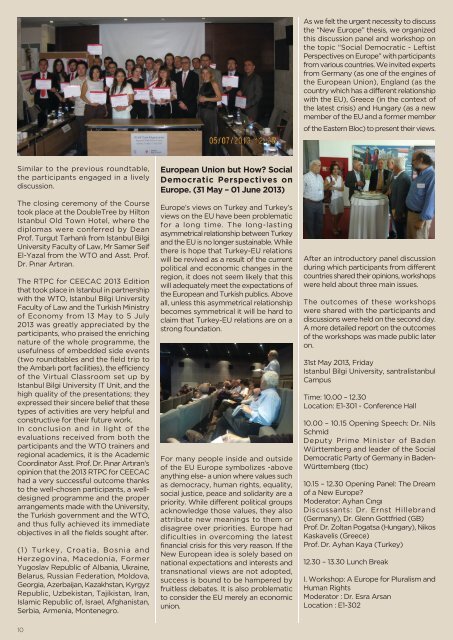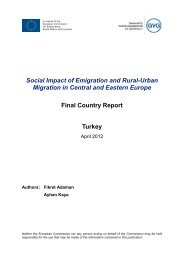NEWSLETTER - İstanbul Bilgi Üniversitesi | AB Enstitüsü
NEWSLETTER - İstanbul Bilgi Üniversitesi | AB Enstitüsü
NEWSLETTER - İstanbul Bilgi Üniversitesi | AB Enstitüsü
Create successful ePaper yourself
Turn your PDF publications into a flip-book with our unique Google optimized e-Paper software.
As we felt the urgent necessity to discuss<br />
the “New Europe” thesis, we organized<br />
this discussion panel and workshop on<br />
the topic “Social Democratic - Leftist<br />
Perspectives on Europe” with participants<br />
from various countries. We invited experts<br />
from Germany (as one of the engines of<br />
the European Union), England (as the<br />
country which has a different relationship<br />
with the EU), Greece (in the context of<br />
the latest crisis) and Hungary (as a new<br />
member of the EU and a former member<br />
of the Eastern Bloc) to present their views.<br />
Similar to the previous roundtable,<br />
the participants engaged in a lively<br />
discussion.<br />
The closing ceremony of the Course<br />
took place at the DoubleTree by Hilton<br />
Istanbul Old Town Hotel, where the<br />
diplomas were conferred by Dean<br />
Prof. Turgut Tarhanlı from Istanbul <strong>Bilgi</strong><br />
University Faculty of Law, Mr Samer Seif<br />
El-Yazal from the WTO and Asst. Prof.<br />
Dr. Pınar Artıran.<br />
The RTPC for CEECAC 2013 Edition<br />
that took place in Istanbul in partnership<br />
with the WTO, Istanbul <strong>Bilgi</strong> University<br />
Faculty of Law and the Turkish Ministry<br />
of Economy from 13 May to 5 July<br />
2013 was greatly appreciated by the<br />
participants, who praised the enriching<br />
nature of the whole programme, the<br />
usefulness of embedded side events<br />
(two roundtables and the field trip to<br />
the Ambarlı port facilities), the efficiency<br />
of the Virtual Classroom set up by<br />
Istanbul <strong>Bilgi</strong> University IT Unit, and the<br />
high quality of the presentations; they<br />
expressed their sincere belief that these<br />
types of activities are very helpful and<br />
constructive for their future work.<br />
In conclusion and in light of the<br />
evaluations received from both the<br />
participants and the WTO trainers and<br />
regional academics, it is the Academic<br />
Coordinator Asst. Prof. Dr. Pınar Artıran’s<br />
opinion that the 2013 RTPC for CEECAC<br />
had a very successful outcome thanks<br />
to the well-chosen participants, a welldesigned<br />
programme and the proper<br />
arrangements made with the University,<br />
the Turkish government and the WTO,<br />
and thus fully achieved its immediate<br />
objectives in all the fields sought after.<br />
(1) Turkey, Croatia, Bosnia and<br />
Herzegovina, Macedonia, Former<br />
Yugoslav Republic of Albania, Ukraine,<br />
Belarus, Russian Federation, Moldova,<br />
Georgia, Azerbaijan, Kazakhstan, Kyrgyz<br />
Republic, Uzbekistan, Tajikistan, Iran,<br />
Islamic Republic of, Israel, Afghanistan,<br />
Serbia, Armenia, Montenegro.<br />
European Union but How? Social<br />
Democratic Perspectives on<br />
Europe. (31 May – 01 June 2013)<br />
Europe’s views on Turkey and Turkey’s<br />
views on the EU have been problematic<br />
for a long time. The long-lasting<br />
asymmetrical relationship between Turkey<br />
and the EU is no longer sustainable. While<br />
there is hope that Turkey-EU relations<br />
will be revived as a result of the current<br />
political and economic changes in the<br />
region, it does not seem likely that this<br />
will adequately meet the expectations of<br />
the European and Turkish publics. Above<br />
all, unless this asymmetrical relationship<br />
becomes symmetrical it will be hard to<br />
claim that Turkey-EU relations are on a<br />
strong foundation.<br />
For many people inside and outside<br />
of the EU Europe symbolizes -above<br />
anything else- a union where values such<br />
as democracy, human rights, equality,<br />
social justice, peace and solidarity are a<br />
priority. While different political groups<br />
acknowledge those values, they also<br />
attribute new meanings to them or<br />
disagree over priorities. Europe had<br />
dificulties in overcoming the latest<br />
financial crisis for this very reason. If the<br />
New European idea is solely based on<br />
national expectations and interests and<br />
transnational views are not adopted,<br />
success is bound to be hampered by<br />
fruitless debates. It is also problematic<br />
to consider the EU merely an economic<br />
union.<br />
After an introductory panel discussion<br />
during which participants from different<br />
countries shared their opinions, workshops<br />
were held about three main issues.<br />
The outcomes of these workshops<br />
were shared with the participants and<br />
discussions were held on the second day.<br />
A more detailed report on the outcomes<br />
of the workshops was made public later<br />
on.<br />
31st May 2013, Friday<br />
Istanbul <strong>Bilgi</strong> University, santralistanbul<br />
Campus<br />
Time: 10.00 – 12.30<br />
Location: E1-301 - Conference Hall<br />
10.00 – 10.15 Opening Speech: Dr. Nils<br />
Schmid<br />
Deputy Prime Minister of Baden<br />
Württemberg and leader of the Social<br />
Democratic Party of Germany in Baden-<br />
Württemberg (tbc)<br />
10.15 – 12.30 Opening Panel: The Dream<br />
of a New Europe?<br />
Moderator: Ayhan Cıngı<br />
Discussants: Dr. Ernst Hillebrand<br />
(Germany), Dr. Glenn Gottfried (GB)<br />
Prof. Dr. Zoltan Pogatsa (Hungary), Nikos<br />
Kaskavelis (Greece)<br />
Prof. Dr. Ayhan Kaya (Turkey)<br />
12.30 – 13.30 Lunch Break<br />
I. Workshop: A Europe for Pluralism and<br />
Human Rights<br />
Moderator : Dr. Esra Arsan<br />
Location : E1-302<br />
10



